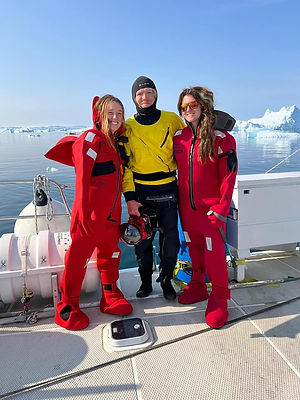COLLABORATIVE RESEARCHPROJECTS


PASSENGER
The PASSENGERS Project, a pioneering effort launched in October 2023, reached a pivotal milestone during its 2024 field campaign, thanks to the integral contributions of the Ocean Research Project (ORP). Partnering with the Virginia Institute of Marine Science (VIMS) under the leadership of Dr. Donglai Gong, ORP played a key role in deploying and recovering advanced gliders used to study sound propagation in dynamic ocean environments. Central to these operations was the SRV Marie Tharp, ORP’s 70-foot steel-hulled sailing research vessel, which served as a versatile and efficient platform for glider operations across the Gulf Stream and the New England seamounts. This collaboration exemplifies ORP’s commitment to advancing oceanographic research through innovative fieldwork and partnerships, enabling the project to collect critical data and push the boundaries of underwater acoustics modeling.
GOALS OF THE PROJECT
The Predictions of AcousticS with Smart Experimental Networks of GlidERS (PASSENGERS) project focuses on enhancing the predictive capabilities of ocean models for acoustic propagation in dynamic environments like the New England seamounts. By integrating adaptive-sampling gliders with advanced data-assimilation techniques, the project aims to address the challenges posed by ocean variability, such as gradients and eddies, on sound transmission. Key goals include improving model accuracy, testing novel glider sampling algorithms, and evaluating uncertainties in acoustic state forecasts.

The Role of Ocean Research Project (ORP)
Ocean Research Project (ORP) has been instrumental in supporting the PASSENGERS initiative by providing critical assets and expertise. Utilizing the SRV Marie Tharp, a steel-hulled sailing research vessel, ORP facilitated the deployment and recovery of gliders, enabling efficient data collection during the 2024 field campaign. This collaboration allowed larger vessels to focus on complementary experiments, maximizing the efficiency of both human-crewed and uncrewed platforms, and contributing significantly to the success of multi-ship operations.
Partnership and Results
A vital partnership with ALSEAMAR provided access to advanced glider technology, including the SeaExplorer equipped with a four-channel Passive Acoustic Monitoring (PAM) system. This collaboration marked the first deployment of such a system for U.S. naval oceanography. The integration of these innovative sensors expanded the project's ability to detect and analyze acoustic signals, setting the stage for future advancements in autonomous underwater vehicle technology.
Success and Results
The 2024 field campaign achieved numerous milestones, including the deployment of four gliders equipped with hydrophones and advanced sensors. These missions captured critical oceanographic and acoustic data, revealing intricate sound-speed profiles and turbulence patterns influenced by the Gulf Stream. Preliminary analysis of acoustic data demonstrated successful detection of various sound sources, providing a robust dataset for evaluating and refining acoustic prediction models. The findings will shape future studies, contributing to advancements in oceanography and underwater acoustics.



Key Publications
ORP's extensive research has contributed to several influential publications, including:
Collaborations
During the GO-MARIE 2023 campaign, the Ocean Research Project (ORP) successfully led the re-deployment of an APEX float in Disko Bay. The operation, conducted aboard the SRV Marie Tharp under the guidance of Field Operations Scientist Nicole Trenholm and Captain Matthew Rutherford, demonstrated the importance of precision and collaboration in advancing marine research.
Key activities included the recovery, inspection, and re-deployment of the APEX float in coordination with Dr. Joshua Willis of NASA’s Jet Propulsion Laboratory (JPL). This collaboration ensured scientific rigor, as data collection methods were fine-tuned with state-of-the-art equipment like RBR CTD water column profiling instruments.




The successful re-deployment highlighted the robustness of the float's design, reinforced with protective measures, and the seamless teamwork between ORP, NASA JPL, and supporting crew. Deliverables, including precise data files, were promptly shared with research collaborators, underscoring the efficiency and transparency of ORP’s operations.

LEARNMORE
-
GO-MARIE 2023 –APEX Float Re-Deployment report
Watch and learn about our projects
Thank you to our sponsors!
.jpg)
Thank you to our project partners!
.jpg)



